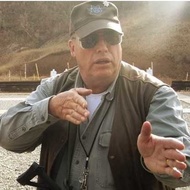16 May 14
When we “go to guns!”
“We are irritated by rascals, intolerant of fools, and prepared to love the rest. But where are they?”
Mignon McLaughlin
We professing Operators spend much time on our weapon skills, as it should be. Recent, inadvertent videos of police officers, and other good people, shooting criminal suspects, in fact, reveal that accuracy, with both pistols and rifles, is actually pretty good! These officer know how to use a set of sights and run a trigger!
I know there are still exceptions, but accuracy, and indeed general competence, has greatly improved since 1970, when I first became a police officer.
Individual tactics have improved also. As an example, officers today are aggressively seeking available cover and using it skillfully.
All good news!
But, there is one critical area that still represents a lethal problem, and we’ve seen scant improvement as long as I can remember:
Officers, and armed citizens, today are so afraid of defending themselves with gunfire, that they habitually expose themselves to what can only be called suicidal risk, in order to avoid pressing the trigger.
We endlessly see them in videos demanding that a suspect drop his gun (that is already pointed in the direction of officers) numerous times. When the suspect fails to comply, they do nothing but repeat the command, over and over!
They have the skills and personal competence, but they lack willingness and determination!
They are often discouraged from ever shooting, under any circumstances, by cynical police administrations, who are more worried about image and political heat than they are about the safety of their own officers. In fact, incompetent officers, who are little more than cowards, are often rewarded for displaying “judicious restraint.” “Judicious restraint” is usually nothing but fearful, and dangerous, indecision. Officers who can’t bring themselves to make a life-or-death decision need to be fired, not rewarded!
But, there is an even greater contributor to officer indecisiveness: We don’t confront the issue honestly and frankly during training.
We train people to operate guns skillfully, but, when the question comes about when to apply deadly force, all anyone wants to do is quote statutes, and tell officers, ad nauseam, about all the liability that attaches!
Video simulators can be helpful, but the unspecified implication is invariably, when you’re involved in a shooting, of any kind, your career with this department is effectively over!
In addition, there is the popular myth of the “good shooting.” When you’re involved in a defensive shooting, a plaintiff’s expert (five years from now) will unfailingly point out where and how you could have done it better. And, I promise you, he’ll be right!
No shooting is ever “perfect,” and that unrealistic expectation has doomed many otherwise promising police careers, as well a providing endless lucrative employment for a virtual army of otherwise unoccupied attorneys!
When your gun is drawn, nothing “good” is going to happen from that point forward. It is only a matter of how “bad” it is going to get. Whether or not you ultimately shoot is largely out of your control. When the suspect decides to lethally endanger you, you’ll have little choice!
And, the aftermath, legally, financially, professionally, and emotionally, will be anything but pleasant! However, unpleasant as it is, it is probably better than being dead. For one, I don’t consider “being dead” a viable “alternative!”
All this must be talked about and thought about, openly and candidly, during training, not discussed only in whispers, as it is in so many quarters.
Officers, and Operators in general, need to be “fully armed,” with all skills, mental/philosophical preparedness, and equipment they will need to be victorious in this dangerous world.
We do less at our, the their, peril!
“It’s discouraging to think how many people are shocked by honesty, and how few by deceit.”
Noël Coward
/John



